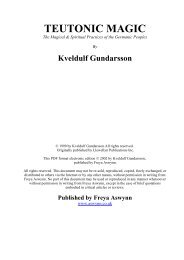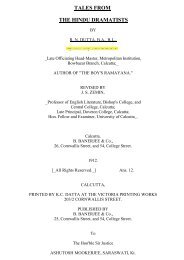Untitled - Awaken Video
Untitled - Awaken Video
Untitled - Awaken Video
Create successful ePaper yourself
Turn your PDF publications into a flip-book with our unique Google optimized e-Paper software.
Chapter 2. Connections 50<br />
earlier, but the ancient interpretation of the concept was somewhat different than<br />
that which has developed in the latter half of the 20 th century. Back then, people<br />
understood that a person was only an individual in that he or she brought special<br />
personal talents into the overall functioning of the community. Talents or skills were<br />
developed by the individual but were “gifted” to the totality of the community in<br />
which one lived. A Viking warrior’s skills were added to the collective skills of the<br />
crew because only by finely-worked team effort were battles won with a minimum<br />
loss of life. A woman’s skills in the household or in the fields were added to those of<br />
the family unit or to those of the community. Individualism, then, had more to do<br />
with one’s individualized function/ role within a community, country, or world than<br />
with acting “individually,” contrary to or in spite of current trends. This philosophy<br />
also brings with it responsibility to family, friends or community and responsibility<br />
for one’s actions and ensuing consequences. By choosing to look at relationships<br />
between things instead of simply at individual things, one quickly begins to realize<br />
that no act is ever committed in complete isolation, and that each act initiates a set<br />
ripples in the large pond (reverberating effects) with the greatest effects being felt<br />
closest to the act’s point of origin. To use an exaggerated example, if a woman slays<br />
her husband, the effects are felt greatest in the families of both parties, slightly less<br />
so in the community (depending on the size and the ’tightness’ of the community),<br />
and at the national level, the act is reported but generally merits but one or two<br />
small paragraphs on the some back page of USA Today (if even that). However, if a<br />
senator commits the same act, because of the number and quality of his relationships<br />
throughout the nation, i.e., the quality or power of individual ørlag (pl. form) he<br />
has interacted with, the effect felt is greater.<br />
In this worldview, responsibility is a burden that only human beings bear, and it<br />
comes in two distinct varieties: responsibility to family, community, and ultimately<br />
to the entire Tree/ Waters complex, and responsibility for one’s own actions. In<br />
the Germanic system this is so because only people are capable of committing physical<br />
acts which result in new layers being put down in the Well of Urð affecting<br />
the Flow of the Waters/ power/ luck through the whole Tree. The wise person,<br />
according to this ancient spiritual philosophy, chooses to interact with strong, compatible<br />
lineages, such as Beowulf’s interaction with the “giantish sword’s lineage,”<br />
strengthening the individual line, but also better to gain access to the flow of power/<br />
luck for the individual himself. By accepting this challenge of responsibility and by<br />
acting in an honorable manner, one is assured of at least maintaining one’s standing<br />
in life in the community if not ultimately improving it. To act out of ignorance,<br />
voluntarily or otherwise, one is dooming himself and his lineage to loss of power/<br />
luck. Germanic sagaic literature is filled with such stories. Responsibility means<br />
acting out of wisdom.
















